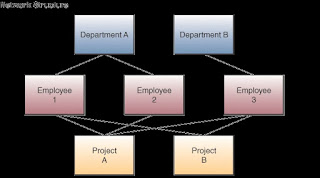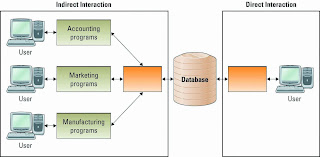Database Fundamentals
- Information is everywhere in an organization
- Information is stored in databases
–Database–maintains information about various types of objects (inventory), events (transactions), people (employees), and places (warehouses)
- Database models include:
–Hierarchical database model–information is organized into a tree-like structure (using parent/child relationships) in such a way that it cannot have too many relationships
–Network database model–a flexible way of representing objects and their relationships
–Relational database model–stores information in the form of logically related two-dimensional tables
Entities and Attributes
- Entity
–a person, place, thing, transaction, or event about which information is stored
–The rows in each table contain the entities
–In Figure 7.1 CUSTOMER includes Dave’s Sub Shop and Pizza Palace entities
- Attributes (fields, columns)
–characteristics or properties of an entity class
–The columns in each table contain the attributes
–In Figure 7.1 attributes for CUSTOMER include Customer ID, Customer Name, Contact Name
Keys and Relationships
Primary keys and foreign keys identify the various entity classes (tables) in the database
–Primary key–a field (or group of fields) that uniquely identifies a given entity in a table
–Foreign key–a primary key of one table that appears an attribute in another table and acts to provide a logical relationship among the two tables
Relational Database Advantages
Increased Flexibility
A well-designed database should:
–Handle changes quickly and easily
–Provide users with different views
–Have only one physical view
•Physical view –deals with the physical storage of information on a storage device eg hard disk
–Have multiple logical views
•Logical view –focuses on how users logically access information
–Eg: a mail-order buss-2 people view diff format (logical views) but same physical view
Increased Scalability and Performance
A database must scale to meet increased demand, while maintaining acceptable performance levels
–Scalability–refers to how well a system can adapt to increased demands
–Performance–measures how quickly a system performs a certain process or transaction
Reduced Information Redundancy
Databases reduce information redundancy
–Redundancy–the duplication of information or storing the same information in multiple places
Inconsistency is one of the primary problems with redundant information-difficult to decide which is most current and most accurate
Increase Information Integrity (Quality)
Information integrity
–measures the quality of information
Integrity constraint
–rules that help ensure the quality of information
–Relational integrity constraint-rule that enforces basic and fundamental information-based constraints
–Eg. Users cannot create an order for a nonexistent customer, provide a markup percentage that was negative etc
--Business-critical integrity constraint-rule that enforce business rules vital to an organization’s success and often require more insight and knowledge than relational integrity constraints
Increased Information Security
Information is an organizational asset and must be protected
Databases offer several security features including:
–Password–provides authentication of the user
–Access level–determines who has access to the different types of information
–Access control–determines types of user access, such as read-only access
Database Management Systems
Database management systems (DBMS) –software through which users and application programs interact with a database
DATA-DRIVEN WEB SITES
Data-driven Web sites –an interactive Web site kept constantly updated and relevant to the needs of its customers through the use of a database
Data-Driven Business Intelligence
BI in a data-driven Web site
Integrating Information among Multiple Databases
Integration–allows separate systems to communicate directly with each other
–Forward integration–takes information entered into a given system and sends it automatically to all downstream systems and processes
 –Backward integration–takes information entered into a given system and sends it automatically to all upstream systems and processes
–Backward integration–takes information entered into a given system and sends it automatically to all upstream systems and processes
Building a central repository specifically for integrated information

















0 comments:
Post a Comment